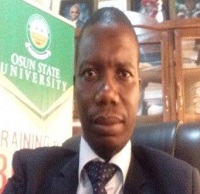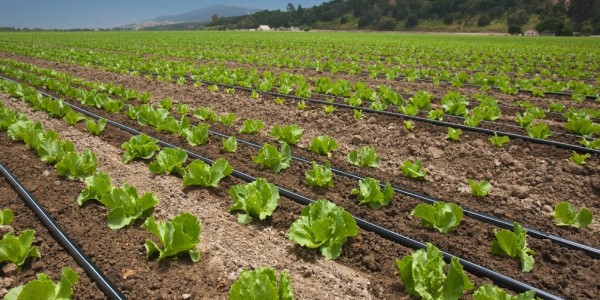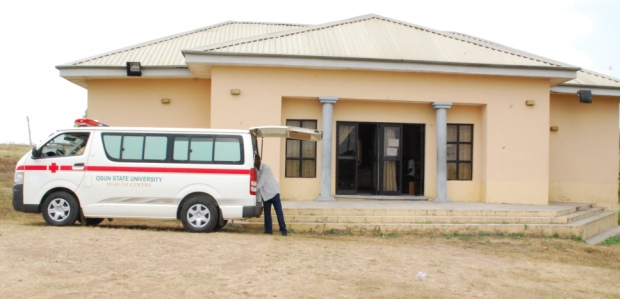
ESTABLISHMENT
The Health service was established to meet the health needs of the University community through the following:
1. Provision of quality health care services (comparable to similar establishments) to the students of the University.
2. Provision of appropriate health care services to members of staff and their families as defined by the University law.
3. Providing timely relevant information on current health issue to the University community and public in general.
OBJECTIVES
I. Provide medical and surgical consultation to the clients.
II. Provide basic medical emergency services.
III. Provide limited admission facility e.g. Observation for up to 24hours.
IV. Maintain health records of registered clients.
V. Provide appropriate referral.
VI. Provide follow up services post referral.
VII. Provide leadership in environmental, work-place and Public Health in the University
Campuses.
VIII. Perform any other function as may be directed by the University.
ORGANIZATIONAL STRUCTURE
There is a University Health Management Committee that formulate policies and surpevices the Health services. Deputy Vice Chancellor is the Chairman. Other members of the Committee are Provost College of Health Sciences, Director of Health Services, Deans of Faculties from College of Health Sciences, representatives of the Registrar.
There are six University campuses and each has One Health centre, namely Osogbo, Okuku, Ejigbo, Ipetu-jesa, Ikire and Ifetedo.
Each Health centre shall have the following units: Medical, Nursing, Pharmacy, Laboratory, Health Information and Environmental. However only the first two is functional as at now.
Osogbo Health centre is the headquarters both administratively and functionally, see the Organogram for more details.
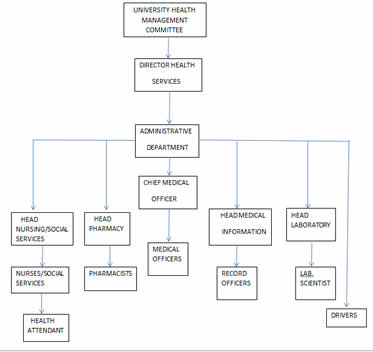
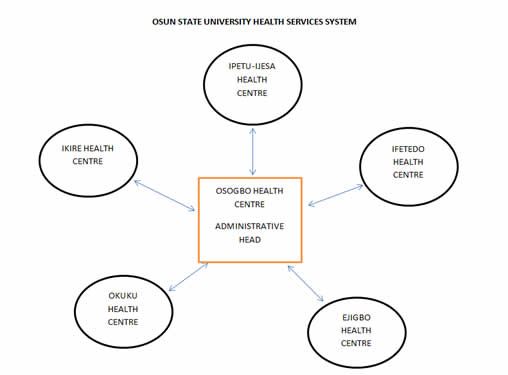
FINANCE OF THE HEALTH SERVICES:
i. The health care service is being financed from annual budget (grant) from the University.
ii. The Capitation from enrolee when the university commences the operation of National Health Insurance Scheme (NHIS) for staff and Tertiary institution social health insurance programme. (TISHIP)
iii. Sundry donations.
NB: ii and iii are yet to be in operation
You are welcome to Osun State University Health Centres. We provide Health Services to students and Staff in all the six campuses of the Institution.
VISION OF UNIVERSITY HEALTH SERVICES
To be a centre of Excellence and reference point at providing Health Services to the University Community.
MISSION STATEMENT
Provide Information, Education, Counselling and supports to students and staff in matters of health, thereby guaranteed maintenance, restoration and rehabilitation of individual wellness.
VALUE
Compassionate and empathetic staff conducts to meeting the clients’ needs.
HISTORY OF UNIVERSITY HEALTH SERVICES
The University Health Services was established in 2006 as first aid posts in all the six campuses Osogbo, Okuku, Ifetedo and Ipetu-Ijesa campus all have dedicated building, while Ikire and Ejigbo operated and still operating on borrowed buildings.
The staff comprise of Medical Doctors and Nurses only. The University being a multi-campus and non-residential medical service were being provided during the working hours and to students only, the student population was less than 5,000.
In 2010 the management expanded the scope of Health Services to the Staff, spouse, and 4 children. An Acting Director was appointed to oversee the University Health Services also University Health Management Committee was constituted under the Chairmanship of the Deputy Vice-Chancellor. More Medical Officers were employed bringing the number to eight. Plan is on-going to employ more Health Professionals like Nurses, Pharmacist, Laboratory Scientists and Health Attendants. There is also on-going effort to expand Osogbo health Centre as the Administrative Head to provide facilities for X-ray, laboratory, Pharmacy and Director’s office.
Student population is about ten thousand (10,000) as at 2012/2013 session.
The next phase of University Health Services Development will be pursued through three (3) means strategies
- National Health Insurance Scheme( NHIS) / Tertiary institution social health insurance programme (TISHP)
- Public Private Partnership Initiative
- Comprehensive Deployment of Information and communication Technology (ICT)
WEEKEND HEALTHCARE SERVICES
UNIOSUN health centres have commenced weekend healthcare services at Ifetedo, Osogbo, Okuku and Ikire campuses. Similar services will commence on the two other campuses soon. Also, all our health centres are now stocked with basic drugs.
Dr. ODENIYI, Ademola Olusola MBBS (LAUTECH), M.Sc. (Ife)
Acting Director
Help lines: Ifetedo-0906-917-2226 Okuku-0906-917-7180 Ikire-0815-927-6498
Ipetu Ijesa-0815-927 6531 Ejigbo-0906-917-3136 Osogbo-0906-933-1002
 |
OSUN STATE UNIVERSITY, P.M.B 4494, OSOGBO NIGERIA |
REVISED UNIVERSITY ACADEMIC CALENDAR FOR 2012/2013 ACADEMIC SESSION
HIGHLIGHTS OF 2012/2013 RAIN SEMESTER CALENDAR
FEBRUARY 2013
- 11th February: E-portal Opens for Registration for Rain Semester
MARCH 2013
- 1st March: E-Portal Closes for Registration
- 4th March: Rain Semester Lectures Begin for All Students
MAY 2013
- 31st May: (13 Weeks of lectures) End of Rain Semester Lectures
JUNE 2013
- 3rd - 7th June: Revision Week
- 10th - 22nd June: Rain Semester Examinations
JULY 2013
- 11th July: Special Examinations Senate
- 12th July: End of 2012/2013 Academic Session
SEPTEMBER 2013
- 21st September: Convocation
Philosophy and Objectives
Philosophy
The law programme of the University is designed to make its graduates function optimally in every area of the legal profession in the 21st century. In the new millennium, a college of law should approach the study of law as a discipline of learning in tertiary institutions from the vintage of law as it functions in society, and not just as rules that have been set and must be applied against the backdrop of our colonial legal heritage which still persists. Osun State University recognizes the fact that the world is now a global village where imaginary political, cultural, social and physical boundaries of countries, nations and societies have disappeared. The law programme is to empower the 21st Century lawyer to meet complex challenges, through transnational studies and multi-lingual ability. Hence, the programme of the College is designed to make our law graduates practitioners and scholars with cutting-edge endowment and intellectual abilities.
Objectives
The objectives of the Law programme are to
(a) train lawyers who will use law as a tool for the resolution of various social, economic and political conflicts in society, and whose level of education has equipped properly to serve as advisers, solicitors or advocates to governments, business and other associations, individuals, families and other bodies, make a career in academics, or deploy their expertise to other productive endeavours ;
(b) deliver sound and forward looking instruction in legal education to create a crop of lawyers and legal scholars that will enhance national and global development, render sound and ethical legal services, and strike a balance between litigiousness and harmonious relationship though alternative dispute resolution;
(c) employ collegiality to educate lawyers who can resolve new issues, not just cite the past. Though most law courses today are still remarkably like they were more than a century ago, we shall take instruction in law beyond the study of cases by giving students a problem-based approach to studying law, employing simulations, role plays, real life clients so as to ensure that each lesson has outcomes that are subjected to formative assessment;
(d) make learning both pedagogically interactive and not impersonal as well as regularly subject the standards in the existing curriculum to relevance test so as to adapt the entire curriculum to changing circumstances;
(e) harness clinical skills to meet the peculiar needs of our host community for legal counselling services in the areas of itinerant trading, micro-financing, small and medium scale enterprises, agriculture, land use and customary tenancy and other legal relationships;
(f) deploy the impacted skills and methods as well as modern technologies, especially Information and Communication Technology, for the achievement of the objectives herein contained.
Programme Offered
The programme that the College of Law runs leads to the Bachelor of Laws (LL.B) degree.
Duration of Programme
The College offers a 5-year standard programme to students with the requisite credit level passes in the Senior Secondary School Certificate, G.C.E. "O" Level or their equivalent. However, it permits Direct Entry candidates to join in year two of the programme. Registration shall not exceed an additional 50% of the duration of the programme if the student fails to graduate within the minimum number of years.
Departments
Though law is a composite programme, for management purposes the College is divided into four (4) departments, namely;
- Department of Business Law
- Department of International Law
- Department of Jurisprudence and Private Law
- Department of Public Law
At inception, however, the College, with the approval of Senate of the University, established two departments to perform the functions of the four departments until such a time that student enrolment may necessitate the taking off of the four. The two departments are the
- Department of Business and Private Law
- Department of Public and International Law
Admission Requirements
UTME Mode
A candidate for admission into the College of Law, Osun State University, must possess at least Senior Secondary School Certificate (S.S.S.C.) with credit level passes in at least five (5) subjects including English Language and Literature in English obtained at not more than one sitting. Such a candidate must have an acceptable pass in the Unified Tertiary Matriculation Examination (“UTME”).
Direct Entry Mode
A candidate for Direct Entry into the degree programme of the College of Law, Osun State University must have;
- A two-year or three-year Diploma Certificate (Upper Credit) of Osun State University or any other recognised institution, plus credit level passes in at least five (5) papers, including English Language and Literature in English, in the Senior Secondary School Certificate Examination (S.S.C.E.) or G.C.E. “O” Level examination or their equivalent; or
- Three (3) papers at principal level in Higher School Certificate Examination (H.S.C.E) or General Certificate of Education (G.C.E.) Advanced Level, together with credit passes in not less than three other subjects including English Language and Literature in English in the S.S.S.C.E. or G.C.E. “O” Level examination or their equivalent; or
- Two (2) papers at Principal Level in H.S.C. or G.C.E. Advanced Level plus credit passes in four (4) other papers (including English Language and Literature in English) in the S.S.S.C.E. or ‘G.CE. “O” Level examination or their equivalent; or
- A degree, in a relevant discipline, of Osun State University or any other recognised University of not less than a Second Class Lower Division.
- Candidates that have successfully gone through the approved and relevant University Sub-Degree programme may be qualified for admission, provided they possess other admission requirements as stated above.
Post-UTME Screening
All Candidates seeking admission into the Osun State University irrespective of their UTME scores shall be required to pass the University Post-UTME Screening Test before being admitted.
Registration Procedure
(a) Students of the College shall normally complete registration at the beginning of the semester.
(b) Any addition or deletion from the courses for which a student is formally registered must be made with the consent of the Course Coordinator.
(c) A student may be allowed to withdraw from a course by the course coordinator before a third of the lectures in that course have been given. Such a student that withdraws after this time or that fails to sit for examination without reasons acceptable to the appropriate College Board shall be deemed to have failed the course. A Grade Point of 0F shall be recorded for the student in the course.
(d) Late registration with penalty in the course may be allowed up to 4 weeks after the commencement of registration.
Graduation Requirements
A student shall be qualified for the award of the degree of Bachelor of Laws (LL.B) of Osun State University when the student has
a) Completed and passed all the Courses he/she registered for, including all the compulsory courses and such elective/optional courses as may be specified by the University/College;
b) Obtained a minimum Cumulative Grade Points Average (CGPA) specified by the University, but not less than 1.50; and
c) Earned the minimum credit units of not less than 194 (5-year course) or 166 for Direct Entry (4 year course).
 |
OSUN STATE UNIVERSITY, P.M.B 4494, OSOGBO NIGERIA |
The Management wishes to confirm the regime of fees payable during the 2012/2013 academic session by all students. For ease of reference, the table of fees as applicable to all students is detailed hereunder:
|
ITEM |
NON-SCIENCE |
SCIENCE |
MEDICINE/LAW |
|||
|
|
Fresh |
Returning |
Fresh |
Returning |
Fresh |
Returning |
|
Acceptance |
25,000.00 |
- |
25,000.00 |
- |
25,000.00 |
- |
|
Tuition |
N75,000.00 |
N75,000.00 |
N75,000.00 |
N75,000.00 |
N100,000.00 |
N100,000.00 |
|
ICT |
5,000.00 |
5,000.00 |
5,000.00 |
5,000.00 |
5,000.00 |
5,000.00 |
|
Library |
5,000.00 |
5,000.00 |
5,000.00 |
5,000.00 |
5,000.00 |
5,000.00 |
|
Games |
5,000.00 |
5,000.00 |
5,000.00 |
5,000.00 |
5,000.00 |
5,000.00 |
|
Examinations |
5,000.00 |
5,000.00 |
5,000.00 |
5,000.00 |
5,000.00 |
5,000.00 |
|
Laboratory/ |
- |
- |
5,000.00 |
5,000.00 |
5,000.00 |
5,000.00 |
|
College Handbook |
500.00 |
- |
500.00 |
- |
500.00 |
- |
|
Caution |
10,000.00 |
- |
10,000.00 |
- |
10,000.00 |
- |
TERMS OF PAYMENT AND REGISTRATION FOR 2012/2013
- The tuition and other fees should be paid once and in full by all students to avoid creating time wasting challenges for the IMTC on Portal Management;
- The deadline for payment for returning students is Wednessday, October 31, 2012;
- Late registration which will attract a penalty of ten thousand naira (N10,000.00) will start on Thursday, November 1, 2012 and end on Thursday, November 8, 2012;
- Any student who failed to register and comply with the deadlines will forfeit the semester;
- All Fresh Students are expected to make full payment by Wednessday, October 31, 2012;
- Any fresh student who failed to register on or before October 31, 2012, would forfeit the provisional admission offer.
Any student that requires additional information or explanation should feel free to contact his/her College Accounts Officer.
Thank you.
Dr. J. O. Faniran, J.P.
Registrar
 |
OSUN STATE UNIVERSITY, P.M.B 4494, OSOGBO NIGERIA |
ACADEMIC CALENDAR FOR 2012/2013 ACADEMIC SESSION
HARMATTAN SEMESTER
AUGUST 2012
- 8th August: Management Meeting
- 27th August-14th Sept: Opening of e-portal for registration and payment of fees for all returning undergraduates
SEPTEMBER 2012
- 3rd September: Commencement of 2012/2013 Academic Session
- 3rd September: Fresh students report for registration
- 3rd - 7th September: Verification of certificates and registration of fresh students
- 3rd - 14th September: E-Registration for fresh students on E-Portal
- 5th September: Management Meeting (10a.m)
- 5th September: Congregation (2.p.m)
- 10th - 14th September: Orientation for fresh students
- 11th September: Academic Planning Sub-Committee
- 12th September: College Board (Science, Engineering & Technology; Management and Social Sciences; Humanities and Culture).
- 13th September: College Board (Agriculture; Education; Health Sciences and Law)
- 14th September: Returning undergraduates resume for the 2012/2013 Academic Session
- 14th September: Committee of Provosts, Deans and Directors
- 17th - 21st September: Late Registration for fresh student
- 17th September: Commencement of Lectures for All Students
- 18th September: Board of Postgraduate Studies
- 19th September: Appointments and Promotions Committee (Admin and Technical)
- 20th September: Finance Sub-Committee
- 21st September: Business Committee of Senate
- 24th September: Appointments and Promotions Committee (Academic)
- 25th September: Staff/ Student Colloquium
- 27th September: Senate
- 28th September: Library Committee
OCTOBER 2012
- 2nd October: University Research Committee
- 3rd October: Development Committee
- 4th October: Security Committee
- 5th October: Ceremonials Committee
- 9th October: College Board (Agriculture; Education; Health Sciences and Law)
- 10th October: College Board (Science, Engineering & Technology; Management and Social Sciences; Humanities and Culture).
- 12th October: Board of Postgraduate Studies
- 15th October: Committee of Provosts, Deans and Directors
- 16th October: University Research Committee
- 17th October: Management Meeting
- 19th October: Business Committee of Senate
- 24th October: Appointments and Promotions Committee (Academic)
- 25th October: Senate
- 26th October: Security Committee
- 30th October: Appointments and Promotions Committee (Admin. and Technical)
NOVEMBER 2012
- 1st November: Staff/Student Colloquium
- 2nd November: Matriculation
- 6th November: Library Committee
- 7th November: University Research Committee
- 8th November: College Board (Science, Engineering & Technology; Management and Social Sciences; Humanities and Culture).
- 9th November: College Board (Agriculture; Education; Health Sciences and Law)
- 12th November: Board of Postgraduate Studies
- 14th November: Management Meeting
- 15th November: Academic Planning Sub-Committee
- 20th November: Committee of Provosts, Deans and Directors
- 21st November: Inaugural Lecture
- 22nd November: Appointments and Promotions Committee (Academic)
- 23rd November: Business Committee of Senate
- 27th November: Appointments and Promotions Committee (Admin and Technical)
- 29th November: Senate
DECEMBER 2012
- 5th December: University Research Committee
- 6th December: Library Committee
- 10th December: College Board (Science, Engineering & Technology; Management and Social Sciences; Humanities and Culture).
- 11th December: College Board (Agriculture; Education; Health Sciences and Law)
- 12th December: Management Meeting
- 13th December: Committee of Provosts, Deans and Directors
- 14th December: Board of Postgraduate Studies
- 17th December: Business Committee of Senate
- 19th December: Appointments and Promotions Committee (Academic)
- 20th December: Senate Meeting
- 21st December: End of Harmattan Semester Lectures
- 21st December: Appointments and Promotions Committee (Admin and Technical)
- 24th Dec – 6th Jan.: Inter-Semester Break
JANUARY 2013
- 7th January: Security Committee
- 7th Jan – 18th January: Harmattan Semester Examinations
- 9th January: Management Meeting
- 14th January: University Research Committee
- 15th January: Library Committee
- 17th January: Academic Planning Committee
- 21st January: End of Harmattan Semester
RAIN SEMESTER
- 21st January: E-portal opens for Registration for Rain Semester
- 24th January: Committee of Provosts, Deans and Directors
- 25th January: Appointments and Promotions Committee (Academic)
- 27th January: E-Portal closes for Registration for Rain Semester
- 28th January: Board of Postgraduate Studies
- 28th January: Business Committee of Senate
- 28th January-1st Feb.: Late Registration
- 29th January: Appointments and Promotions Committee (Admin and Technical)
- 29th January: Commencement of Rain Semester Lectures
- 31st January: Senate
FEBRUARY 2013
- 6th February: Management Meeting (10.a.m)
- 6th February: Congregation (2p.m)
- 8th February: University Research Committee
- 12th February: Staff/ Student Colloquium
- 14th February: College Board (Science, Engineering & Technology; Management and Social Sciences; Humanities and Culture).
- 15th February: College Board (Agriculture; Education; Health Sciences and Law)
- 18th February: Appointments and Promotions Committee (Academic)
- 19th February: Committee of Provosts, Deans and Directors
- 20th February: Library Committee
- 22nd February: Business Committee of Senate
- 25th February: Appointments and Promotions Committee (Admin. and Technical)
- 26th February: Board of Postgraduate Studies
- 27th February: Academic Planning Sub-Committee
- 28th February: Senate
MARCH 2013
- 4th March: University Research Committee
- 5th March: Ceremonials Committee
- 6th March: Management Meeting
- 7th March: Library Committee
- 8th March: College Board (Science, Engineering & Technology; Management and Social Sciences; Humanities and Culture).
- 12th March: College Board (Agriculture; Education; Health Sciences and Law)
- 13th March: Staff/Student Colloquium
- 14th March: Finance Sub- Committee
- 15th March: Board of Postgraduate Studies
- 18th March: Committee of Provosts, Deans and Directors
- 20th March: Appointments and Promotions Committee (Academic)
- 20th March: Inaugural Lecture
- 21st March: Development Committee
- 22nd March: Business Committee of Senate
- 25th March: Appointments and Promotions Committee (Admin. and Technical)
- 28th March: Senate
APRIL
- 2nd April: Security Committee
- 4th April: College Board (Science, Engineering & Technology; Management and Social Sciences; Humanities and Culture).
- 5th April: Board of Postgraduate Studies
- 5th April: College Board (Agriculture; Education; Health Sciences and Law)
- 10th April: Management Committee
- 11th April: Committee of Provosts, Deans and Directors
- 16th April: Business Committee of Senate
- 22nd – 26 April: Lecture Free Week
- 23rd April: Appointments and Promotions Committee (Academic)
- 25th April: Senate
- 26 April: Appointments and Promotions Committee (Admin and Technical)
- 29th April: Commencement of Rain Semester Examination
MAY 2013
- 3rd May: End of Rain Semester Lectures
- 6th -10th May: Lecture Free Week
- 7th May: College Board (Science, Engineering & Technology; Management and Social Sciences; Humanities and Culture).
- 8th May: Management Meeting
- 9th May: College Board (Agriculture; Education; Health Sciences and Law)
- 13th -24th May: Rain Semester Examinations
- 15th May: Board of Postgraduate Studies
- 16th May: Ceremonials Committee
- 17th May: Committee of Provosts, Deans and Directors
- 20th May: University Research Committee
- 23rd May: Business Committee
- 30th May: Senate
JUNE 2013
- 4th June: Academic Planning Committee
- 6th June: Library Committee
- 10th June: Finance Sub-Committee
- 11th June: College Board (Science, Engineering & Technology; Management and Social Sciences; Humanities and Culture).
- 13th June: College Board (Agriculture; Education; Health Sciences and Law)
- 14th June: Committee of Provosts, Deans and Directors
- 17th June: Development Committee
- 20th June: Business Committee
- 21st June: Ceremonials Committee
- 27th June: Senate
- 28th June: End of 2012/2013 Session
SEPTEMBER 2013
- 21st September: Convocation
 Prof. Sola AKINRINADE, B. A. (Hons), M. A. (Ife), Ph.D (London)
Prof. Sola AKINRINADE, B. A. (Hons), M. A. (Ife), Ph.D (London)
Email:
Professor Sola Akinrinade, a Professor of History, assumed office as pioneer Vice-Chancellor of Osun State University in August 2007. He attended the University of Ife (1977-81, 1982-84) and the London School of Economics and Political Science, University of London (1985-88). He holds the BA (First Class) and MA in History (Ife) and PhD. in International Relations(London).[Read More...]
![]()
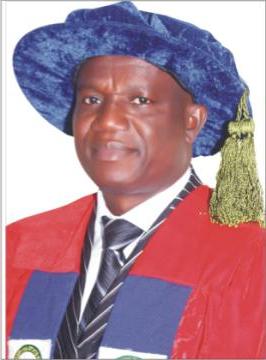 Prof. Ganiyu Olatunji OLATUNDE, B.Sc. (Lagos), M.Sc., Ph.D (Ibadan)
Prof. Ganiyu Olatunji OLATUNDE, B.Sc. (Lagos), M.Sc., Ph.D (Ibadan)
Email: ,
Prof. Ganiyu Olatunji OLATUNDE is a Professor of Entomology. He has a B. Sc. Degree Second Class Upper in Zoology of the University of Lagos and an M. Sc. in Agricultural Biology and PhD n Agriculture, both of the University of Ibadan. He was a Research Officer I at the Nigerian Stored Products Research Institute, Lagos and a Research Fellow of the International Institute for Tropical Research, Ibadan. [ Read More... ]
![]()
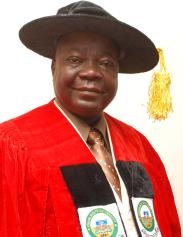 Dr. Julius Olusakin FANIRAN, B. A. (Hons), M. PA (Ife), Ph.D (Ib.), MNIM, FCPA
Dr. Julius Olusakin FANIRAN, B. A. (Hons), M. PA (Ife), Ph.D (Ib.), MNIM, FCPA
Email: ,
Dr. Faniran was born on September 6, 1956. He had his primary education between 1962 and 1967, his secondary education between 1968 and 1972, National Diploma in Secretarial Studies at The Polytechnic, Ibadan between 1974 and 1976 and his first degree between 1977 and 1981 at the University of Ife, Ile-Ife where he bagged and honours degree in English Language. [ Read More... ]
![]()
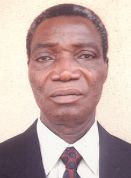 Michael A. OLAOSUN, Ph.D
Michael A. OLAOSUN, Ph.D
Email: ;
The Acting University Librarian of Osun State University is Dr. Michael A. OLAOSUN, a PhD holder in Educational Technology. After his first degree in French language at the University of Ibadan, he attended the College of Librarianship, Wales, Aberystwyth, UK and later obtained his Masters and Ph.D at Obafemi Awolowo University, Ile-Ife. His acquisition of the French language served him well in his career of librarianship...[ Read More... ]
![]()
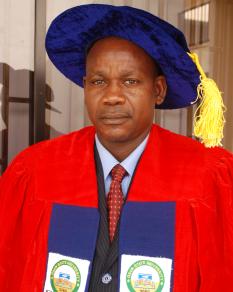 Mr. Fatai A. LASISI, B.Sc. (Hons), ACTI, FCA, ICAN
Mr. Fatai A. LASISI, B.Sc. (Hons), ACTI, FCA, ICAN
Email: ,
Alhaji Fatai Adebayo Lasisi is a fellow of the prestigious Institute of Chartered Accountants of Nigeria (ICAN) and an Associate of Chartered Institute of Taxation (CITN). He graduated from University of Ilorin with a B. Sc. (Hons) degree in Public Administration with a Second Class Upper Division. He was awarded with the Departmental prize for the best student in the Department in 1986. He also bagged a Masters degree of Obafemi Awolowo University, Ile-Ife.[ Read More... ]
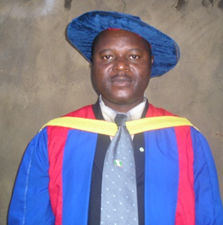 Professor O.C. Adebooye
Professor O.C. Adebooye
Director, Quality Assurance Unit, Osun State University, Osogbo.
Professor of Plant Physiology.
B. Agric.(Plant Science) OAU, Ile-Ife, MSc and PhD (Agronomy/Plant Physiology) Ibadan. Certificate in Tissue Culture techniques (United Nations University, Tokyo), Certificate in Cytogenetics (IITA, Ibadan) and Certificate in Food and Plant Analysis (United Nations/CSIR, India).
- Fellow of the College of Research Associates (CRA), Tokyo, Japan.
- Postdoc United Nations University, CFTRI, Mysore, India.
- Fellow, Alexander von Humboldt Foundation at the University of Bonn, Germany.
- Fellow, German Academic Exchange Service (DAAD).
- Visiting Professor, University of Bonn, Germany
- Visiting Professor, University of Hohenheim, Germany.
He has won 12 competitive international research grants and attended about 70 international conferences in about 20 countries. Adebooye was the first Nigerian to win the Humboldt Alumni Scientist Award by the German Government’s Humboldt Foundation. Adebooye together with other three institutions won a $3 million research grant from IDRC, Canada. He has authored about 45 research articles and edited three books.
Recent Publications
- Adebooye O.C., M. Hunsche, G. Noga and C. Lankes(2011) Morphology and density of trichomes and stomata in Trichosanthes cucumerina L. (Cucurbitaceae) as affected by leaf age and salinity. Turkish Journal of Botany (In Press)
- Adebooye O.C. (2011) Food Value of Underutilized African Indigenous Vegetables: Preservation and Processing options to optimize nutrients supply. Keynote Paper Presented at the African Crop Science Conference, Maputo, Mozambique October 10- 14, 2011.
- Adebooye O. C., M. Schmitz-Eiberger, M. Hunsche, C. Lankes, and G. Noga Pigments, photochemistry, leaf ultra-structure and minerals quantification of Solanum macrocarpon L. as affected by salinity in a perlite-compost medium. Paper Presented at the African Crop Science Conference, Maputo, Mozambique October 10- 14, 2011.
- Adebooye O.C., M. Schmitz-Eiberger, C. Lankes and G.J. Noga (2010) Inhibitory effects of sub-optimal root zone temperature on leaf bioactive components, photosystem II (PS II) and minerals uptake in Trichosanthes cucumerina L- Cucurbitaceae. Acta Physiologiae Plantarum 32: 67- 73
- Adebooye O.C., K.A. Taiwo and A.A. Fatufe (Editors) (2010) Biotechnology development and threat of climate change in Africa: The case of Nigeria Volume 1. ISBN 978-3-86955-402-0Cuvillier Publishers Göttingen, Germany.. 311 pages
- Adebooye O.C., K.A. Taiwo and A.A. Fatufe (Editors) (2010) Biotechnology development and threat of climate change in Africa: The case of Nigeria Volume 2. ISBN 978-3-86955-403-7Cuvillier Publishers Göttingen, Germany.. 292 Pages.
- Adebooye O.C., G.J. Noga and C. Lankes (2009) Rooting zone temperature affects emergence and growth traits of Snake Tomato (Trichosanthes cucumerina L.). Journal of Central European Agriculture, 10(3): 239-244
Recent Project:
Professor O. Clement Adebooye of the Department of Agronomy, Osun State University in collaboration with scientists from the Obafemi Awolowo University, Ile-Ife(OAU); Cape Breton University, Nova Scotia, Canada (CBU) and University of Manitoba, Canada (UofM) won the IDRC research grant under the programme: Canadian International Food Security Research Fund ( CIFSRF). The project is titled : “Sustainable production and utilization of under-utilized Nigerian vegetables to enhance rural food security.” The project will run for three and a half years (42 months) March 2011- August 2014.
The grant is about three (3) million dollars ($3.0 milion). Out of this amount, UNIOSUN has a total budget of about $1.1 million. The project will carry out survey on indigenous vegetables of southwest Nigeria, conduct field research, determine nutraceutical properties of vegetables and vegetables products, carry out impact assessments, training of women farmers etc. On this project, ten (10) researchers from UNIOSUN will be trained at the CBU and UofM, Canada on agricultural research planning, implementation and reporting.
Osun State University is concerned about ensuring the quality of its academic programmes towards the production of highly skilled graduates who can contribute meaningfully to socio-economic development of the State and Nigeria and the global community. The Quality Assurance (QA) Unit conducts a host of activities that are designed to improve the quality of inputs, processes and outputs of the university system. It acts as a mechanism to guarantee that the system is “fit for purpose”. It also ensures the following: Value for money – measured by achieving more with less in an efficient manner; Transformation – from one state to another with value-added activities; Perfection – perceived as the attainment of a near flawless product, service and system; Excellence – viewed as the attainment of exceptionally high standard product, service and system.
Structure of the Quality Assurance Unit
The Quality Assurance Unit is an integral part of the Vice Chancellor's office and headed by a Director. The Director of Quality Assurance Unit is complimented by unit. There are also Quality Assurance Representatives from each Faculty and Department that work with the Director in achieving the unit's set goals. The Director, Quality Assurance is the chairman of the implementation/monitoring committee for the strategic plan of the University.
Quality Assurance Policy Statement
UNIOSUN is committed to being a Centre of excellence providing quality higher education.
- This commitment is supported by a Quality Assurance framework which provides the planning and strategies: reporting and continuous improvement that create awareness to all students and stakeholders, ensuring that systems, processes and core business activities are fit for the purpose for which they are desired.
- QA for the University exists to safeguard the general interest of all stakeholders in sound standards and maintenance of high quality education. It will encourage continuous improvement in the management of quality academic processes.
- The QA Unit coordinates all the processes in order to deliver quality assurance functions, based on the University’s Vision and Mission statements:
The specific objectives of UNIOSUN’s quality assurance system are:
- develop Quality Assurance policy for UNIOSUN
- monitor implementation of the University strategic plan
- contribute to the achievement of the goals defined for the educational activities and the learning environment.
- monitor and ensure that performance processes in all aspects of the University functions are appropriate and relevant.
- reveal flaws and recognize the strong points of instruction and training.
- serve as a tool for systematic efforts for quality assurance and quality improvement.
- evaluate the quality assurance system periodically
- coordinate Students' Evaluation of staff and programmes
- encourage self-assessment of teaching staff
- coordinate internal and external assessment of programmes and institution as a whole
- Capacity building: organize seminars, workshops and conferences
Duties of the Director of Quality Assurance
The Director of Quality Assurance of Osun State University is responsible to the Vice-Chancellor in the general superintendence over the academic and administrative affairs of the Quality Assurance Unit which include the following:
- Development of a quality assurance policy
- Creation of awareness of the provisions for QA: Review the existing procedures and making them known to the stakeholders.
- Conduct annual evaluation of the University’s Strategic Plan
- Preparation of check lists of procedures for performance evaluation
- Set up a Quality Assurance Implementation Committee
- Conduct self-assessment programs that have completed their cycle
- Develop a self-assessment manual
- Keep stakeholders: staff and students well informed of evaluation results, efforts made and recommendations periodically
- Analyze past accreditation reports of the University and highlight areas of remediation preparatory for next exercise
- Monitor and assess quality, adequacy and currency of facilities and resources in Departments, Faculties and Colleges
- Monitor and ensure compliance to academic brief, staff student ratio, quality and mix, teaching and research quality
- Administer and analyze results of teaching Portfolio Instruction
- Develop a blueprint for the systemic development of the University
- Develop and update criteria and format for assessing teaching quality and effectiveness through peer group and student review
- Ensure and oversee development of Instructional Technology
- Participate in the review of academic programme curricular of the University and evaluation of proposal for new academic programmes
- Participate in the preparation of the University’s Annual Budget
- Organize regular capacity building and skill acquisition for academic and non-academic staff
- Carry out all other duties assigned by the Vice-Chancellor.
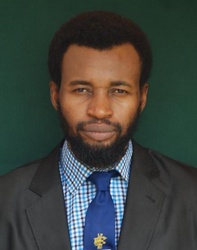 Dr. Mutahir Oluwafemi ABANIKANNDA
Dr. Mutahir Oluwafemi ABANIKANNDA
Director
Lecturer, Science, Technology and Mathematics Education
Biosketch
Mukhtar Oluwafemi ABANIKANNDA (Ph.D.) is an Associate Professor of Computing/IT Education. He is a digital innovation specialist who is into Digital Transformation, Learning Technologies, Technopreneurship, Artificial Intelligence, Cybernetics, Science & Technology Education. He holds degrees of prestigious universities in Science, Science Education and Technology Education. Aside other numerous commendable contributions to knowledge, he wrote the first postgraduate degree thesis in Nigeria on the application of hypermedia courseware to science learning, designed and produced the first hypermedia instructional strategy for learning Chemistry in Nigerian Schools. It is worth noting that he was the first anywhere in the world to employ Kirkpatrick's evaluation model to assess computer-based concept mapping strategies which he designed and developed in the field of Chemistry, this includes the fact that he designed, developed and produced his own distinct models for the assessment of computer-based learning strategies.
Dr. Abanikannda has been deeply involved in carrying out funded and non-funded research projects nationally and internationally both as a Principal Investigator and as a Co-Investigator in worthy research grants on: Digital Learning Technologies, Hybrid Learning, Artificial Intelligence, Digital Perspectives of Cultural Diversity and Development of Artificial Neural Network-Based Model for Estimating Nano Pollution among others. Generally, he has ventured into: AI, Fuzzy Logic and Neural Networks, Potentiality of Web Syndication and Offline Media Streaming Portmanteau in Procedural Knowledge Optimation, Podcast Potentiality in Increasing Students’ Self-Steams and Performance Transformations and Creating a Secure and Flexible Path to Public Cloud through Digital Learning Transformation. He has dabbled into the implications of using big data and artificial intelligence for research management, Human-Computer Interaction, Augmented Reality, Engineering Education and Transformational Learning.
Abanikannda has also been deeply involved in series of advancements in the frontiers of knowledge as regards digital innovation and engagement. This has provided opportunity for creative engagement in solving global and contextual problems and created access for Africans to participate in the burgeoning economy of the technology space. Consequently, he facilitated a Digital Innovation and Business Start-up Hub (DIBUSH) in Osun State University with a mission to support the aforementioned by providing opportunities for trainees and innovators within his immediate environment. He is the Implementation Facilitator and Head of DIBUSH, he is a member of the Supervisory board of Opolo Global Innovation Limited (Opolo Global Innovation Limited, is a leading innovation enabler, incubator and accelerator closely connected with Fintech). He has served the university and external community in numerous other capacities, nationally & globally.
Mukhtar is a consultant to some popular agencies and an external assessor to a number of tertiary institutions and research institutes. He has published more than seventy articles in reputable journals and contributed many chapters to quality books. He belongs to numerous professional national and international bodies. He has attended sixty-five national and international conferences till date. He belongs to numerous professional national and international bodies including: WAOE, IFETS, MERLOT, AITIE, EMTAN, TRCN, NAE, ISOC,ACS, RSC, CSN, ICCON, AARF, IAARR, IAAM, ECTRD, Tech Republic.
Research Focus
Computing/IT Education
More...
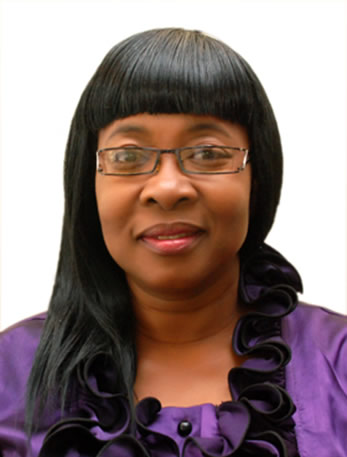 Professor Esther Olufunmilayo Asekun-Olarinmoye received her B.Sc. (Hons.) degree (Biology) in 1978 from the Philippine Union College, Caloocan City, Philippines and her MD (Doctor of Medicine) in 1982 from The Filemon D. Tanchoco Medical Foundation, Manila Central University, Manila Philippines. This was followed by post-graduate residency training program in Community Health at the University College Hospital, Ibadan, Nigeria. She then qualified as a Fellow of the West African College of Physicians, Faculty of Community Health (FWACP) in 1996. She is also an associate Fellow of the National Post-graduate Medical College of Nigeria (Faculty of Public Health). She has at least 12 years of teaching experience at the University level. She joined Osun State University in August, 2010 and is currently an associate Professor in the Department of Community Medicine, College of Health Sciences and the Ag. Director of Quality Assurance for the University. She has been in several positions of responsibility including; Ag. Head, Department of Community Medicine, LAUTECH, Ag. Head, Department Community Medicine, Osun State University, Chairman, Association of Public Health Physicians of Nigeria, Osun State Chapter, Ag. Director of Quality Assurance, Osun State University, Member of Planning Committee of Babcock University Medical School, Member of Board of Trustee and Council, Adeleke University, Board Member, Seventh-day Adventist Hospital, Ile-Ife and Health Director, Seventh-Day Adventist Osun Conference. She has also shown good academic leadership; has authored over fifty (>50) publications.
Professor Esther Olufunmilayo Asekun-Olarinmoye received her B.Sc. (Hons.) degree (Biology) in 1978 from the Philippine Union College, Caloocan City, Philippines and her MD (Doctor of Medicine) in 1982 from The Filemon D. Tanchoco Medical Foundation, Manila Central University, Manila Philippines. This was followed by post-graduate residency training program in Community Health at the University College Hospital, Ibadan, Nigeria. She then qualified as a Fellow of the West African College of Physicians, Faculty of Community Health (FWACP) in 1996. She is also an associate Fellow of the National Post-graduate Medical College of Nigeria (Faculty of Public Health). She has at least 12 years of teaching experience at the University level. She joined Osun State University in August, 2010 and is currently an associate Professor in the Department of Community Medicine, College of Health Sciences and the Ag. Director of Quality Assurance for the University. She has been in several positions of responsibility including; Ag. Head, Department of Community Medicine, LAUTECH, Ag. Head, Department Community Medicine, Osun State University, Chairman, Association of Public Health Physicians of Nigeria, Osun State Chapter, Ag. Director of Quality Assurance, Osun State University, Member of Planning Committee of Babcock University Medical School, Member of Board of Trustee and Council, Adeleke University, Board Member, Seventh-day Adventist Hospital, Ile-Ife and Health Director, Seventh-Day Adventist Osun Conference. She has also shown good academic leadership; has authored over fifty (>50) publications.
She is a co-editor for the Western Nigerian Journal of Medical Sciences (the official publication of LAUTECH Teaching Hospital), an assistant editor to the Research Journal of Health Sciences (the official publication of the College of Health Sciences, Osun State University) and a peer reviewer for twenty-one (21) international and national journals.
She has supervised thirteen (13) post-graduate dissertations successfully and several undergraduate projects.
Educational institutions attended and qualifications obtained with Dates:
University College Hospital, Ibadan (FWACP, 1996)
Manila Central University, FDT Medical Foundation, Manila (M.D, 1982)
Philippine Union College, Caloocan City, Manila, Philippines (B.Sc. (Hons.) Biology, 1978)
Middle East College, Beirut, Lebanon. 1975-1976
Adventist College of West, Africa, Ilisan-Remo 1973-1975
Work experience in the University system
OSUN STATE UNIVERISTY
- Associate Professor (Aug. 4, 2010 – till date) – Department of Community Medicine
- Ag. Head of Department, Community Medicine – Aug 4, 2010 – August 1, 2011
- Ag. Director, Quality Assurance – August 1, 2011 till date
- Certified MDCN (Medical and Dental Council of Nigeria) CPD/CME (Continuing Professional Development/Continuing Medical Education) Facilitator – College of Health Sciences – 2011 till date
LADOKE AKINTOLA UNIVERSITY OF TECHNOLOGY
- Lecturer 1 Jan., 2002 – May, 2005.
- Snr. Lecturer May, 2005 – Aug., 2010
- Clinical Consultant (LTH) Jan., 2002 – Aug., 2010 l
- Ag. Head of Department of Community Medicine 2003-2006
MEMBERSHIP OF PROFESSIONAL BODIES
- European Society of Contraception and Reproductive Health – Member
- Nigerian Medical Association – Member
- West African Post-Graduate Medical College – Fellow
- National Post-Graduate Medical College of Nigeria – Associate Fellow
- Medical and Dental Consultants Association of Nigeria – Member
- Association of Community Physicians of Nigeria – Member.
- Association of Community Physicians of West Africa – Member
- Association of Women Physicians – Member
SERVICES
(i) University -
Within Osun State University:
- Head of Department, Community Medicine, August, 2010 - 2011
- Ag. Director, Quality Assurance, August 1st, 2011 till date
- Member of Committee that Reviewed the Dress Code for CHS
- Member of Examination Monitoring Panel to Okuku Campus MSS
- Member University Strategic planning Committee – Community Relation Group
- Member, Committee on Strategic Plan, Dec, 2011
- Member, College Academic Board
- Member, Board of Postgraduate studies
- Member, Academic Planning Sub-Committee
- Member, Academic Staff Training & Development Committee
- Member, Committee of Provosts, Deans and Directors
- Member of Senate
- Member, Congregation
- CME Speaker/Facilitator (NMA/MDCAN Approved), 2011 –till date
- Speaker, Lecture on antimicrobial resistance: a challenge to public health to celebrate World Health Day 2011 at the University auditorium
- Speaker, College Lecture: Essentials of Research Ethics for Researchers in Health Sciences during a 2-day Workshop at the College of Health Sciences, Osun State University, 21st Nov., 2011.
- Acting for Provost, College of Health Sciences, Dec. 4-16, 2011.
- Member, Local Organizing Committee - Scientific Conference Committee – Finance \Committee for the 2nd SIDCAIN Non-Communicable diseases Update Course, Annual Lecture and Scientific Conference, Feb 1-3, 2012.
- Chairperson, Implementation/Monitoring Committee for 2012-2016 UNIOSUN Strategic Plan
Within Ladoke Akintola University of Technology:
- Head of Department 2003 – 2006
- Acting for Dean, Faculty of Clinical Sciences, CHS
- Faculty representative at College and University programmes
- Coordinator, Residency training programme, LTH
- Member, Strategic planning committee, 2003
- Chairperson, College welfare committee
- College orator
- University orator
- Staff Adviser, WOTCLEF Vangard, LTH
- Chairperson, Faculty Accreditation Committee
- Member, Faculty Finance Committee
- Member, Curriculum Review Committee
- Visiting Consultant, LTH, Osogbo, August 16th, 2010 till date.
(ii) Community
- Health Education programme on Stress Management for Adventist Men’s Ministry, July 2008
- Community health out-reach at Ataoja’s Palace for market women and secondary school students on awareness of breast cancer, 2009
- Community health education on NTA Ile – Ife Television programme, “You and your Health”, 2005
- Community health education on OSBC Radio programme, 2009
- Community health out-reach at Osogbo city hall on awareness of kidney diseases and glaucoma, 2011
- Community out-reach and screening exercise for rural and sub-urban communities for cardiovascular risk factors, kidney disease and glaucoma at Alajue and Ibokun, 2011
- Identified and established urban and rural practicing centers for training UNIOSUN medical students and offer services to the respective communities
- Member, Planning Committee for Babcock University, College of Medicine
- Member, Board of Trustee and Governing Council of Adeleke University, Ede
- Guest Lecturer, Health Challenges of Our Time, at the Annual Camp Meeting of the Seventh-day Adventist Church, Osun State Conference, Ede, 24th Oct., 2011.
- Guest Lecturer, All a woman will want to know about Menopause at Adventist Women Conference Meeting, SDA Osun State Conference, Ede.
(iii) National/International
- Chairperson, Association of Public Health Physician of Nigeria, Osun State Chapter. Dec. 2008 - April, 2012.
- Chairperson, Scientific Committee for the AGM and Scientific Conference of the Association of Public Health Physicians of Nigeria (APHPN), June 2008.
- Member of Panel for Accreditation Exercise to Lagos State University Teaching Hospital, Community Medicine Department
- Invited Guest Lecturer on Socio-economic factors and cardiovascular diseases at an international seminar/workshop on cardiovascular disease prevention organized by the dept. of Internal Medicine, LAUTECH, CHS, Osogbo in collaboration with the University of Loussane, Dept of Preventive and Social Medicine on 22nd July, 2005
- Invited Guest Lecturer at the Osun State Year 2007 State Council on Health Meeting. Presented paper on the various options available for Health Care Financing in a developing economy on 31st Oct, 2007.
- Invited Guest Lecturer at The National Conference on Public Health and the Challenges of Achieving the MDGs: Science, Policy and Programmes, 2008.
- Member of Panel for Accreditation Exercise to Federal Medical Center, Iddo - Ekiti, Community Medicine Department, March, 2012.
- Peer Reviewer for twelve (12) National/International Journals
PUBLICATIONS
THESIS / DISSERTATION:
i. Risk Factors of Neonatal Tetanus in Ibadan, Oyo state – Part II FWACP ( Oct., 1996).
ii. Comparative study of health of Nigerian children in day-care centers and home environment in Ibadan, Nigeria.
Journal Articles
1. FATUNDE OJ, ASEKUN-OLARINMOYE EO, OGUNDIRAN FA (1995). Seasonal prevalence of protein-energy malnutrition (PEM) in Ibadan, Oyo state. Nig. J. of Paediatr. 22(3): 57-63
2. ASEKUN-OLARINMOYE EO, LAWOYIN TO, ONADEKO MO (2003). Risk factors for neonatal tetanus in Ibadan, Nigeria. European Journal of Pediatrics. 162: 526-527. (International Journal)
3. ASEKUN-OLARINMOYE EO, LAWOYIN TO, ONADEKO MO (2003). Risk factors associated with neonatal tetanus in Ibadan, Nigeria - A Revisit. Afri. J. Med. med. Sci. 32: 275-278.
4. TAIWO SS, ASHUBIARO AB, OLUGBENGA-BELLO AI, OPARINDE DP, ASEKUN-OLARINMOYE EO, ASHIRU JO (2004). Pattern of Sexually Transmitted Diseases Seen At Ladoke Akintola University Teaching Hospital, Osogbo, Nigeria. Nigerian Journal of Genito-urinary Medicine. 3&4 (1&2): 4 - 7.
5. FAWOLE OI AND ASEKUN-OLARINMOYE EO (2005). Media practitioners and Gender-based violence in Ibadan, Nigeria. Journal of the Royal Society for the Promotion of Health.125(6):272-280. (International Journal)
6. ASEKUN-OLARINMOYE EO, OYEMADE AA, LAWOYIN TO (2005). Health status of children aged under two years cared for in Day-Care Centers and the home environment in Ibadan, Nigeria. Journal of Community Medicine and Primary Health Care. 17(1): 33-37
7. DAIRO MD, LAWOYIN TO, ONADEKO MO, ASEKUN- OLARINMOYE EO AND ADENIJI AO (2005). HIV as an Additional risk factor for anemia in pregnancy : evidence from Primary care level in Ibadan, Southwestern, Nigeria. Afri. J. Med. med. Sci. 34: 275-279.
8. JENYO MS AND ASEKUN-OLARINMOYE EO (2005). Prevalence of Scoliosis in Secondary School Children in Osogbo, Osun State, Nigeria. Afri. J. Med. med.sci. 34:361- 364.
9. ADEROUNMU AOA, EGBEWALE BE, OJOFEITIMI EO, FADIORA SO, OGUNTOLA AS, ASEKUN-OLARINMOYE EO, ADEOTI ML AND AKANBI O (2006). Knowledge, Attitudes and Practices of the Educated and Non-Educated Women to Cancer of the Breast in Semi-Urban and Rural areas of Southwest, Nigeria. The Nigerian Postgraduate Medical Journal. 13(3):182-188.
10. ASEKUN-OLARINMOYE EO, FAWOLE OI, DAIRO MD, AMUSAN OA (2007). Knowledge, Attitudes and Perception of Teacher Role in sex education in public schools in Nigeria. Int. J Adolesc Med health. 19(4):425-434. (International Journal)
11. BAMIDELE JO, ASEKUN-OLARINMOYE EO, ODU OO, AMUSAN OA, EGBEWALE BE (2007). Socio-demographic Characteristics and health risk behaviors among students of a Tertiary institution in South Western Nigeria. Afri. J. Med. med.sci.36:129-136
12. ODU OO, ASEKUN-OLARINMOYE EO, BAMIDELE JO, EGBEWALE BE, AMUSAN OA and OLOWU AO (2007). Knowledge, Attitudes to HIV/AIDS and Sexual Behaviors of students in a Tertiary institution in South-Western Nigeria. The European Journal of Contraception and Reproductive Health. 2007;13(1):90-96. (International Journal)
13. AMUSAN OA & ASEKUN-OLARINMOYE EO (2006-2007). Knowledge, Beliefs and Attitudes to Female Genital Mutilation (FGM) in Shao Community of Kwara State, Nigeria. International Quarterly of Community Health Education. 27(4):337-49.
DOI: 10.2190.1Q.27.4.E. (International Journal)
14. ASEKUN-OLARINMOYE EO & AMUSAN OA (2008). The Impact of health education on attitudes towards female genital Mutilation (FGM) in a rural Nigerian community. The European Journal of Contraception and Reproductive Health. 13(3):289-297
DOI: 10.1080/13625180802075174. (International Journal)
15. ASEKUN-OLARINMOYE EO (2008). Immunization practices among mothers whose babies developed Neonatal Tetanus: Need for Review of the Nigerian National Policy on Immunization. Western Nigerian Journal of Medical Sciences. 1(1):20-25
16. ASEKUN-OLARINMOYE EO, BAMIDELE JO, OLOWU AO, ODU OO, EGBEWALE BE & AMUSAN OA (2009). Sexual Risk Behaviours and Risk Perception of HIV/AIDS among a Rural Adult Population in Southwestern Nigeria. Research Journal of Medical Sciences 3(2):80-86. ISSN: 1815-9346. (International Journal)
17. ASEKUN-OLARINMOYE EO, BAMIDELE JO, EGBEWALE BE, ASEKUN-OLARINMOYE IO, OJOFEITIMI EO (2009). Consumer Assessment of Perceived Quality of Antenatal Care Services in a Tertiary Health Care Institution in Osun State, Nigeria. Journal of The Turkish German Gynecological Association; 10: 89-94. (International Journal)
18. ASEKUN-OLARINMOYE EO, EGBEWALE BE AND OLAJIDE FO (2009). Subjective Assessment of Childhood Fever by Mothers Utilizing Primary Health Care Facilities in Osogbo, Osun State, Nigeria. Nigerian Journal of Clinical Practice,12(4):434-438.
19. ASEKUN-OLARINMOYE EO & OLADELE EA (2009). Condom Use among Undergraduates in Osun State, Nigeria: Implication for Sexually Transmitted Infection (STIs)/HIV Prevention. Research Journal of Medical Science, 3(6):179-189 ISSN:1815-9346. (International Journal)
20. OJOFEITIMI EO, ORJI EO, ASEKUN-OLARINMOYE EO, BAMIDELE JO, OWOLABI OO AND OLADELE EA (2009). Poor Knowledge of Causes and Prevention of Stillbirths among Health Care Providers: An Implication for Regular In-Service Training in Developing Countries. International Journal of Childbirth Education; 24 (4): 26- 29. (International Journal)
21. LAWOYIN TO, ONADEKO MO AND ASEKUN-OLARINMOYE EO, (2010). Neonatal Mortality and Perinatal Risk Factors in Rural South West Nigeria: A Community-Based Prospective Study. West African Journal of Medicine, 29 (1):19-23.
22. FAWOLE OI, SALAWU TA, and ASEKUN-OLARINMOYE E0 (2009-2010). Intimate Partner Violence: Prevalence and Perceptions of Married Men in Ibadan, Nigeria. Int’l Quarterly of Community Health Education, 30(4):349-364. doi: 10.2190/IQ.30.4. (International Journal)
23. OLOWU AO, ASEKUN-OLARINMOYE EO, ADEBIMPE WO, DAIRO MD, AND OLADELE EA (2010). Factors Associated with Poor-Use of Contraception among In-School Tertiary Institution Students in South Western Nigeria. Journal of life and environmental sciences; 10(1&2)
24. ASEKUN-OLARINMOYE EO, LAWOYIN TO AND ASEKUN-OLARINMOYE IO (2010). Effect of Rearing Environment on the Feeding Pattern of Under 2 years old Nigerian Children. Early Child Development and care. 1-12.
DOI: 10.1080/03004430.2010.526209. (International Journal)
25. ADEBIMPE WO, BAMIDELE JO, ASEKUN-OLARINMOYE EO, ABODURIN O AND ADEGOKE K (2010). Knowledge and attitude of small scale entrepreneurs in Osogbo Southwestern Nigeria towards Group Occupational Health Services. Journal of business and organizational development. 2010;2:1-8.
26. ASEKUN-OLARINMOYE EO, OLAJIDE FO and ASEKUN-OLARINMOYE, IO (2011). HIV/AIDS Preventive Measures among Public Secondary School students in a Sub-Urban Community in Southwestern Nigeria. Acta Satech; 4(1):81-96.
27. ASEKUN-OLARINMOYE EO, DAIRO MD, ADEOMI AA (2011). Parental attitudes and practice of sex education of children in Nigeria. Int. J Child Health Hum Dev 4(3):301-307. (International Journal)
28. OLUGBENGA-BELLO AI, ASEKUN-OLARINMOYE EO & ADEOMI AA (2011). Primary Health Care Workers’ Role in Monitoring Children’s Growth and Development in Nigeria, West Africa. Global Journal of Health Sciences. 3(1): 30-39. ISSN 1916-9736 E-ISSN 1916-9744. (International Journal)
29. ADEBIMPE WO, ASEKUN-OLARINMOYE EO, BAMIDELE JO, ABODURIN OL, OLOWU AA (2011). A Comparative Study of Awareness and Attitude to Nosocomial Infections among Levels of Health Care Workers in Southwestern Nigeria. Continental J. Tropical Medicine 5(2):5-10. ISSN:21414167. http://www.wiloludjournal.com (International Journal)
30. BAMIDELE JO, ASEKUN-OLARINMOYE EO, OLAJIDE FO, ABODUNRIN OL (2011). Prevalence and Socio-Demographic Determinants of Under-Weight and Pre-Obesity among In-School Adolescents in Olorunda Local Government Area, Osun State, NIGERIA. TAF Preventive Medicine Bulletin; 10(4):397-402. doi:10.5455/pmb.20110610032359 (International Journal)
31. OLUGBENGA-BELLO AI, ASEKUN-OLARINMOYE EO, ADEOMI AA. (2011). Effectiveness of Health Education in Improving HIV/AIDS Knowledge and Risk Behaviours Of Commercial Vehicle Drivers In Ilorin, Nigeria. Global Journal of Medical Research; 11(5): version 1.0: 35-43. Online ISSN: 2249-4618 & Print ISSN: 0975-5888 (International Journal)
32. ASEKUN-OLARINMOYE EO, ADEBIMPE WO, OMOBUWA O, OYEKENU-AGORO Y, & OMISORE AG (2011). Awareness, Knowledge and Attitude towards screening and risk factors for Diabetes among staff of a University in Southwestern Nigeria. Nigerian Journal of Endocrine Practice; 5(2):19-25.
33. ADEBIMPE, WO, ASEKUN-OLARINMOYE E, HASSAN AO, ABODUNRIN O, OLAREWAJU S, AKINDELE AA (2011). Treatment outcomes among TB and HIV co-infected pregnant women in resource poor settings of south western Nigeria. Sierra Leone J of Biomedical Research; 3(3):151-156 ISSN 2219-3170(Online) ISSN 2076-6270 (Print) (International Journal)
34. ADEBIMPE WO, ASEKUN-OLARINMOYE EO, BAMIDELE JO, OLUGBENGA-BELLO AI, AKINDELE RA (2011). A comparative study of breastfeeding, post partum abstinence and amenorrhea as proximate determinants of fertility among women in rural and urban communities in Osun State. African Journal of Medical Sciences; 4(2): 45-52. (International Journal)
35. ASEKUN-OLARINMOYE EO, DAIRO MD, ASEKUN-OLARINMOYE IO & ADEBIMPE WO (2012). Parental expectations on school sex education in a sub-urban community in Osun State, Nigeria. Int. J Child Adolesc Health; 5(1):39-45 (International Journal)
36. ASEKUN-OLARINMOYE EO, DAIRO MD, ABODURIN OL & ASEKUN-OLARINMOYE IO (2011-2012). Practice and Content of Sex Education among Adolescents in a Family Setting in Rural Southwest Nigeria. Int’l Quarterly of Community Health Education; 32 (1): 57-71 (International Journal)
37. ADELEKE NA, OLOWOOKERE SA, KOMOLAFE JO, ASEKUN-OLARINMOYE EO, HASSAN MB (2012). Sexual Violence against Women: Seven Years Experience in a General Hospital, Osogbo, Southwestern, Nigeria. Nigerian Journal of Clinical Practice; 15(2):190-3.
38. ADEBIMPE WO, ABODURIN OL & ASEKUN-OLARINMOYE EO (2012). Pattern of Use of Traditional and Alternative Medical Therapy among Clients on Anti-Retrroviral Drugs in Southwestern Nigeria. Journal of Medicine and Biomedical Sciences, 3(1):20-23. (International Journal)
39. OMOBUWA O, ASEKUN-OLARINMOYE EO & OLAJIDE FO (2012). Knowledge and perception of reproductive health services among in-school adolescents in Ile-Ife, Osun State, Nigeria. Journal of Medicine and Medical Sciences, 3(7): 481-88. (International Journal)
Refereed Conference Proceedings/Refereed Abstracts
1. LAWOYIN TO, OKHAHUME S, ADEJUWON G, OSINOWO H, and ASEKUN-OLARINMOYE EO (2004). Partners of Brothel-Based Sex Workers in Ibadan: Implication for Intervention and Program Development. XV International AIDS Conference in Bangkok,Thailand. MEDIMOND S.r.1. E710L7625(ed):333-337.
2. ASEKUN-OLARINMOYE EO, Akunwusi PO, Adebimpe WO, Isawumi MA, Hassan MB, Alebiosu CO, Adewole OA, & Makanjuola OB (2011). Prevalence of Hypertension among rural adult population of Osun State,
Southwestern, Nigeria. Nigerian Journal of Endocrine Practice; 5(2):45.
3. ISAWUMI MA, HASSAN MB, AKINWUSI PO, ADEBIMPE O, ASEKUN-OLARINMOYE EO, ALEBIOSU CO, & ADEWOLE T (2011). Prevalence of Causes of Ocular Morbidity in the Posterior Segment seen among Two Rural Communities of Osun State, Nigeria. Nigerian Journal of Endocrine Practice, 5(2):50
4. Adebimpe WO, Asekun-Olarinmoye EO, Hassan AO, Bamidele JO, Abodunrin OL, Olarewaju SO and Akindele AA (2011). Treatment outcomes among TB and HIV co-infected Pregnant women in Resource poor setting of southwestern Nigeria. International Union against TB and Lung cancer, 18th African Union Conference Abuja. Book of Abstract page 25.
5. FATUNDE OJ, ASEKUN-OLARINMOYE EO, OGUNDIRAN FA. Prevalence of protein-energy malnutrition (PEM) in Ibadan, Oyo State. In: (A). Current-info & (B). 25th annual and 4th International Conference of the Pediatric Association of Nigeria Proceedings.
6. ASEKUN-OLARINMOYE EO, Fawole IO, Dairo MD, Olowu AO and Amusan OA. Teachers’ Knowledge, attitude and perception of their roles in the sexuality education of students in Nigerian secondary school. In: National Post-Graduate Medical College of Nigeria’s Inaugural Scientific Conference 2005 Book of Abstracts. 11th -13th Oct. 2005.
7. ASEKUN-OLARINMOYE EO & EGBEWALE BE. Cervical Cancer and Cervical Cancer Screening: Knowledge, Attitude, and Practice of Women in Olorunda Local Government Area of Osun State, Nigeria. In: West African Medical College of Physicians Scientific Conference Proceedings. 15th November, 2005.
8. ASEKUN-OLARINMOYE EO & EGBEWALE BE. Breast Cancer and Breast Self-Examination: Knowledge, Attitude, and Practice of Women in Olorunda Local Government Area of Osun State, Nigeria. In: West African Medical College of Physicians Scientific Conference Proceedings. 15th November, 2005.
9. Asekun-Olarinmoye IO, Asekun-Olarinmoye EO, Fatiregun AA and Fawole IO. Assessment of the Role of Religious Leaders in the Management of HIV/AIDS in Ibadan, Southwestern Nigeria. In: 3rd African Conference on Sexual Health and Rights Conference Proceedings. Feb, 2008.
10. ASEKUN-OLARINMOYE EO, BAMIDELE JO, EGBEWALE BE & OJOFEITIMI EO. Consumer Assessment of Quality of Antenatal Care (ANC) Services in a Tertiary Health Care Institution in Osun State, Nigeria In: The 24th Annual National Scientific Conference of the Association of Public Health Physicians of Nigeria (APHPN) Book of Abstracts. Osun 2008. June 11-14, 2008
11. BAMIDELE JO, ASEKUN-OLARINMOYE EO, OLAJIDE FO & OKE YF. Prevalence of Anemia and Assessment of Nutritional Status among pupils of a Rural Community Model Primary School in Osun State, Nigeria. In: The 24th Annual National Scientific Conference of the Association of Public Health Physicians of Nigeria (APHPN) Book of Abstracts. Osun 2008. June 11-14, 2008
12. BAMIDELE JO, ASEKUN-OLARINMOYE EO & OLAJIDE FO. Prevalence and determinants of Adolescent Obesity among Public Secondary School Students in Olorunda Local Government Area, Osun State, Nigeria. In: The 24th Annual National Scientific Conference of the Association of Public Health Physicians of Nigeria (APHPN) Book of Abstracts. Osun 2008. June 11-14, 2008
13. ASEKUN-OLARINMOYE EO & OLAJIDE FO. HIV/AIDS Preventive Measures among Public Secondary School Students in a Surb-Urban Community in South-Western Nigeria. In: The 24th Annual National Scientific Conference of the Association of Public Health Physicians of Nigeria (APHPN) Book of Abstracts. Osun 2008. June 11-14, 2008.
14. ASEKUN-OLARINMOYE EO, Odu OO, Bamidele JO, Ojofeitimi EO & Olarewaju AO. Barriers to Contraceptive Use among Women of Child Bearing Age in Inner City Area of Osogbo Metropolis. In: The 24th Annual National Scientific Conference of the Association of Public Health Physicians of Nigeria (APHPN) Book of Abstracts. Osun 2008. June 11-14, 2008.
15. ASEKUN-OLARINMOYE, EO. Capacity Development in the Management of Infectious Diseases in Nigeria to Meet the MDGs at the National Conference on Public Health in Nigeria and the Challenges of Achieving the MDGs: Science, Policy and Programme, July 2008.
16. ASEKUN-OLARINMOYE EO, AKINWUSI PO, ADEBIMPE WO, ISAWUMI MA, HASSAN MB, OLAITAN JO, ALEBIOSU CO, ADEWOLE TA, OLOWE OA, MAKANJUOLA OB, MABAYOJE VO, ABIODUN OM (2011). Perception and use of Antimicrobials among staff of a University Community in Southwestern Nigeria. Osun State University, College of Health Sciences, College Research Day Book of Abstracts; 1(1):1-2.
17. ASEKUN-OLARINMOYE EO, ASEKUN-OLARINMOYE IO,OLUGBENGA-BELLO AI (2011). Assessment of Community Attitude towards the Reproductive Rights and Sexual Life of People Living with HIV/AIDS in Olorunda Local Government Area, Osogbo. Osun State University, College of Health Sciences, College Research Day Book of Abstracts; 1(1):31-32.
18. ASEKUN-OLARINMOYE EO, OYEKENU-AGORO Y, ADEBIMPE WO, OMOBUWA O, OMISORE AG (2011). Prevalence and Practice of Female Genital Cutting (FGC) in Osun State, Nigeria: 8 Years Post Anti-FGM Bill Passage – Research Proposal. Osun State University, College of Health Sciences, College Research Day Book of Abstracts; 1(1):36-38.
19. ASEKUN-OLARINMOYE EO, DAIRO MD, ABODURIN OL & ASEKUN-OLARINMOYE IO. Practice and content of sex education within family setting: a study among adolescents in a rural community in Osun State, Southwest, Nigeria. In West African College of Physician 35th Annual General & Scientific Meeting Abstract book; WACP/SS3B/31:50
20. ASEKUN-OLARINMOYE EO, DAIRO MD, ASEKUN-OLARINMOYE IO & ADEBIMPE WO. Parental expectations on school sex education in a sub-urban community in Osun State, Nigeria. In West African College of Physician 35th Annual General & Scientific Meeting Abstract book; WACP/SS3B/34:52
Un-refereed Conference Proceedings
1. Gender Based-Violence (What is Gender Based Violence and Type of Violence against Women). - At a Workshop on Ending Gender-Based Violence using Media Practitioners in Ibadan jointly Organised by UNIFEM & Dept. of Community Medicine, UCH at Kakanfo Inn, Ring road Ibadan on 15th April, 2003.
2. Assessment of Reproductive Health Needs. – At Seminar on Translating Strategies Needed to Reduce Maternal Mortality to Action at Local Government Level organized by Association of Local Government of Nigeria (ALGON), Osun State Chapter at Local Government Service Commission Hall, State Secretariat, Abere, Osogbo on 24 & 25 October, 2006.
3. Mobilizing Resources for Maternal and Child Health - At Seminar on Translating Strategies Needed to Reduce Maternal Mortality to Action at Local Government Level organized by Association of Local Government of Nigeria (ALGON), Osun State Chapter at Local Government Service Commission Hall, State Secretariat, Abere, Osogbo on 24 & 25 October, 2006.
4. Understanding Supervisory Roles in Health Care Services Delivery at A Seminar on Enhancing the Supervisory Competence of Community Health Officers in the Local Government Service of Osun State on 22nd & 23rd August, 2007.
5. Assessing the Effectiveness of Health Care Services at the Grassroots at A Seminar on Enhancing the Supervisory Competence of Community Health Officers in the Local Government Service of Osun State on 22nd &23rd August, 2007.
6. Health Care Financing options in a developing Economy at the Osun State Council on Health Meeting and Conference October, 2007organized by the Osun State Ministry of Health.
CONFERENCES ATTENDED (indicating titles of papers presented)
1. 25th annual and 4th International Conference of the Pediatric Association of Nigeria.
Title of Paper: Prevalence of protein-energy malnutrition (PEM) in Ibadan, Oyo State
2. In-house training & workshop on Tuberculosis mgt. & control jointly organized by LAUTECH Teaching Hospt. & Damien Foundation, Belgium, 14th Aug., 2002.
Title of Paper: Epidemiology, Prevention and Control of Tuberculosis
3. Workshop on Ending Gender-Based Violence using Media Practitioners in Ibadan jointly Organised by UNIFEM & Dept. of Community Medicine, UCH at Kakanfo Inn, Ring road Ibadan on 15th April, 2003.
Title of Paper: Gender Based-Violence: What is Gender Based Violence and Type of Violence against Women
4. Symposium on Fake and Expired Drugs at the Union Week of LAUTECH MEDICAL STUDENT UNION GOVERNMENT, LTH ON 14TH, Aug., 2003.
Title of Paper: Social Impact of Fake/Expired Drugs on the Community.
5. International seminar/workshop on cardiovascular disease prevention organized by Dept. of Internal Medicine, LAUTECH, CHS, Osogbo in collaboration with the University of Loussane, Dept of Preventive and Social Medicine on 22nd July, 2005.
Title of Paper: Socio-economic factors and cardiovascular diseases
6. Seminar on Translating Strategies Needed to Reduce Maternal Mortality to Action at Local Government Level organized by Association of Local Government of Nigeria (ALGON), Osun State Chapter at Local Government Service Commission Hall, State Secretariat, Abere, Osogbo on 24 & 25 October, 2006.
Title of Paper: Assessment of Reproductive Health Needs.
7. Seminar on Translating Strategies Needed to Reduce Maternal Mortality to Action at Local Government Level organized by Association of Local Government of Nigeria (ALGON), Osun State Chapter at Local Government Service Commission Hall, State Secretariat, Abere, Osogbo on 24 & 25 October, 2006.
Title of Paper: Mobilizing Resources for Maternal and Child Health.
8. Seminar on Enhancing the Supervisory Competence of Community Health Officers in the Local Government Service of Osun State on 22nd & 23rd August, 2007.
Title of papers:
1. Understanding Supervisory Roles in Health Care Services Delivery.
2. Assessing the Effectiveness of Health Care Services at the Grassroots.
9. Osun State Council on Health Meeting and Conference October, 2007 organized by the Osun State Ministry of Health.
Title of paper: Health Care Financing options in a developing Economy
10. The 24th Annual National Scientific Conference of the Association of Public Health Physicians of Nigeria (APHPN)
Title of papers:
a. Consumer Assessment of Quality of Antenatal Care (ANC) Services in a Tertiary Health Care Institution in Osun State, Nigeria.
b. HIV/AIDS Preventive Measures among Public Secondary School Students in a Sub-Urban Community in South-Western Nigeria.
c. Barriers to Contraceptive Use among Women of Child Bearing Age in Inner City Area of Osogbo Metropolis. June 11-14, 2008.
d. Prevalence and determinants of Adolescent Obesity among Public Secondary School Students in Olorunda Local Government Area, Osun State, Nigeria.
e. Prevalence of Anemia and Assessment of Nutritional Status among pupils of a Rural Community Model Primary School in Osun State, Nigeria.
11. National Conference on Public Health in Nigeria.
Title of paper: Capacity Development in the Management of Infectious Diseases in Nigeria to Meet the MDGs and the Challenges of Achieving the MDGs: Science, Policy and Programme, July 2008.
12. 3 days training workshop on the Ethics of HIV Research and Service Provision organized for undergraduate and postgraduate medical students lecturers on research ethics sponsored by SIDACTION, France at Ibadan. 21st – 23rd Sept., 2010.
13. 5 days training for Doctors on antiretroviral therapy in the management of HIV/AIDS in adults and management of Tb/HIV co-infection organized by Institute of Human Virology, Nigeria (IHVN ACTION Project). At Sunview Hotel Akure, Ondo State, 19th – 23rd July, 2010
14. The 35th Annual General Meeting and Scientific Conference of the West African College of Physicians, Nigerian Chapter, 12-15 July, 2011 in Lagos, Nigeria.
Title of Papers:
i. Parental expectations on school sex education in a sub-urban community in Osun State, Nigeria.
ii. Practice and content of sex education within family setting: a study among adolescents in a rural community in Osun State, Southwest, Nigeria.
15. IN-HOUSE TRAINING/WORKSHOP
1. 2 day Workshop for Provosts, Deans and Heads of Departments at Osun State University 1 & 2 August, 2011.
16. SIDCAIN 2nd Non-Communicable Diseases (NCDs), Update Course, Annual Lecture & Scientific Conference on Feb 1-3, 2012
Title of Paper:
i. ASEKUN-OLARINMOYE EO, Akunwusi PO, Adebimpe WO, Isawumi MA, Hassan MB, Alebiosu CO, Adewole OA, & Makanjuola OB. Prevalence of Hypertension among rural adult population of Osun State,
Southwestern, Nigeria.
ii. ISAWUMI MA, HASSAN MB, AKINWUSI PO, ADEBIMPE O, ASEKUN-OLARINMOYE EO, ALEBIOSU CO, & ADEWOLE T. Prevalence of Causes of Ocular Morbidity in the Posterior Segment seen among Two Rural Communities of Osun State, Nigeria.
iii. ASEKUN-OLARINMOYE EO, ADEBIMPE WO, OMOBUWA O, OYEKENU-AGORO Y, & OMISORE AG. Awareness, Knowledge and Attitude towards screening and risk factors for Diabetes among staff of a University in Southwestern Nigeria.
17. IN-HOUSE CAPACITY BUILDING WORKSHOP FOR ACADEMIC STAFF, Osun State University, Osogbo. Feb., 10, 2012.
18. IN-HOUSE CAPACITY BUILDING WORKSHOP FOR ACADEMIC STAFF ON WRITING SCIENTIFIC ARTICLES AND AWARD WINNING GRANTS, Osun State University, Osogbo, July 2, 2012
19. 8th Annual Conference of the Institute of Strategic Management, July 4-6, 2012 at Fun Filled Park & Events, adjacent Leisure Spring Hotel, Iwo-Osogbo Road, Osogbo, Osun State.
EXTRA-CURRICULAR ACTIVITIES
- Gardening, Music, Reading, Photography
- Member of Women’s Ministry of Seventh-day Adventist Church.
The Directorate of Research and Linkages is a Unit under the Office of the Vice Chancellor. The Directorate is currently headed by Prof. Amos Popoola, a Professor of Mathematics.
Core mandate of the Directorate is to pursue the implementation of the University Research Policy and facilitate the research efforts of the University which is geared towards fostering a culture of research excellence at the University.
To achieve the goal of the University in Research, the following activities coordinated by the Directorate are being undertaken by the University.
• Organising regular capacity building workshops for staff on research writing and grant seeking to enable them compete for international research grants
• Encouraging academic staff to undertake cutting edge research to enhance the rating and visibility of the University as a centre of excellence in research
• Encouraging academic staff to engage in result-oriented research activities in their areas of specialization especially those in line with the University’s priorities and are relevant to the needs of the immediate community, Osun State, Nigeria and the rest of the world.
• Providing enabling environment for cutting edge research through the provision of research grants and necessary facilities such as books, journals, laboratories, workshops, studios and ICT equipment.
• Strengthening the University Research Committee to promote and coordinate research activities in the University.
• Consolidating the University Research Ethics Committee to coordinate and regulate all matters pertaining to research ethics and integrity in the University
• Attracting and retaining seasoned research personnel to enhance the conduct of genuine problem solving research.
• Initiating and promoting research linkages with reputable institutions and agencies including industry, community, public service and professional organizations within and outside Nigeria.
• Implementing the existing policy on promotion as it affects research productivity of staff.
• Publishing research findings of academic staff annually to attract funding from various sources.
• Sourcing overseas placement for academics to gain more experience from advanced laboratories and colleagues.
• Supporting staff attendance at short training courses and learned conferences.
• Encouraging academic departments to host learned conferences on campus.
• Strengthen Postgraduate training to enhance the development of a research culture
• Nominating and rewarding staff whose research efforts attracts huge funding and those with publications in high ranking journals for award annually.
University thematic areas of research:
• Integrated food production for sustainable development
• Values systems and implications for education and development.
• Natural resource management
• Infrastructure development
• Human resource management
• Internal diversities and implications for development
• Security and governance in fragile environments
• Food quality and safety
• Renewable energy
• Health systems
• Agrochemicals and health
• Inclusive education
• Urban renewal
• Threatened languages
• ICT
Collaborating Institutions
The University currently have collaboration with the following Institutions/organizations:
• Aarhus University, Denmark
• Dullah Omar Institute, University of the Western Cape South Africa
• Stellenbosch University South Africa
• Medical Research Council (MRC) Gambia
• Indiana University
• University of Kwazulu-Natal South Africa
• University of The Gambia, Banjul
• Alabama A & M University
• International Development and Research Centre (IDRC), Canada
• University of Manitoba, Canada
• University of Saskatchewan
• Cape Breton University, Sydney
• National Open University of Nigeria (NOUN)
• Nigerian Institute of Social and Economic Research (NISER)
• Raw Materials Research and Development Council Abuja
• Teaching and Research in Natural Sciences for Development in Africa (TRenD in Africa)
Development of MOU with some other notable institutions all over the world is at different stages of processing by the Directorate in conjunction with relevant Units of the University.
The Department of Human Resource Development is under the College of Management and Social Sciences, Okuku. The Department offers one academic programme;
B.Sc. Industrial Relations and Personnel Management
PHILOSOPHY
The philosophy of the Department of Industrial Relations and Personnel Management, Osun State University, Okuku Campus is to produce graduates who are sensitive, skilful and able to appreciate political phenomena.
It also seeks to produce graduates who can make objective contributions to national development by offering viable alternative political and policy strategies and modules to national development in this period of national search for sustainable political development.
OBJECTIVES
i) Produce graduates who are generally competitive in the global village and develop entrepreneurial spirit in them.
ii) Prepare them for leadership careers in administration, diplomatic service and other managerial endeavors.
iii) To give them the needed exposure and strive vigorously to rekindle their interest in public affairs as enlightened and disciplined citizens.
ADMISSION REQUIREMENTS
General
For admission into any of the first degree programmes of the University, a candidate shall be required to possess the following minimum qualifications:
1. Senior Secondary School Certificate (SSCE) or its equivalents with credit level passes in five (5) subjects at not more than two sittings. The candidate must also earn an acceptable score in the Unified Tertiary Matriculation Examination (UTME).
2. Candidates seeking admission by direct entry into the 200 level, must have at least five (5) O/L credits, two of which must be at Advanced Level or approved equivalents.
Departmental Admission Requirement
U.M.E. Candidates
For admission into the first degree programmes in the Department of Human Resource Development, a candidate must have the Senior Secondary School Certificate (SSCE) or its equivalents with credit level passes in five (5) subjects: English Language, Mathematics, and one Business subject to form the core subjects, with credit in two other relevant humanities, social and management sciences, or even the natural and physical sciences subjects at not more than two sittings. The candidate must also earn an acceptable score in the Unified Tertiary Matriculation Examination (UTME).
Direct Entry Candidates
Candidates seeking admission by direct entry into the 200 level Human Resource Development programmes must have Advanced Level passes in at least two (2) relevant subjects, in addition to credit level passes in five of the subjects listed in 3.2.1 above at the SSCE or its equivalents. Candidates with ND and approved equivalents in relevant fields with at least a lower credit may be considered for direct entry into the programme. Candidates with acceptable pass in the UNIOSUN Foundation Programme (or the advanced diploma programme) are also eligible for admission into the 200 level, provided they possess the requisite qualification for entry into the 100 level of the programme.
Post UTME Screening
All Candidates seeking admission into the University, irrespective of their UTME scores, shall be required to pass the University post UTME Screening test before being admitted.
Registration Procedure
(a) Students shall normally complete registration at the beginning of the semester.
(b) Any addition or deletion from the courses for which a student is formally registered must be made with the consent of the course coordinator.
(c) A student may be allowed to withdraw from a course by the course administrator before a third of lectures might have been given. Such a student who withdraws after this time or who fails to sit for examination without reasons acceptable to the appropriate Faculty/College Board shall be deemed to have failed the course. A Grade point of 0F shall be recorded for the student in the course.
(d) Late registration in the course may be allowed with penalty of up to 4 weeks after the commencement of registration.
Duration of Degree Programmes
The minimum number of years to be spent to be awarded a first degree in a programme of study in non-professional area in the university shall be four years (or three years minimum for direct entry candidates). Registration shall not exceed an additional 50% of the duration of the programme if the student fails to graduate within the minimum number of years.
Graduation Requirements
To qualify for the award of a degree of the Osun State University, a student is required to have:
(i) completed and passed the prescribed number of units including all compulsory courses specified by the University.
(ii) completed and met the standards for all required and optional courses.
(iii) obtained the prescribed minimum CGPA.

